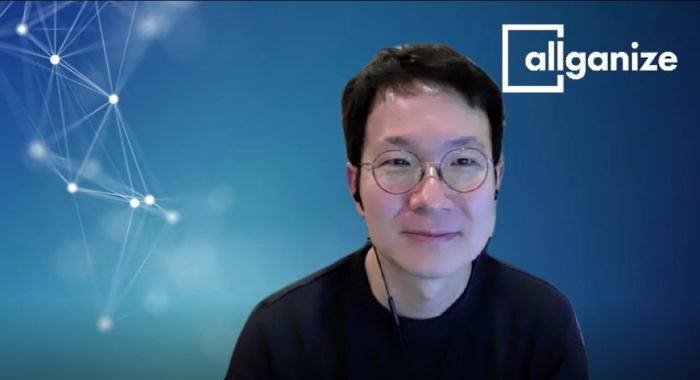AI search
Allganize eyes $26.5 bn enterprise search market
By Mar 17, 2021 (Gmt+09:00)
3
Min read
Most Read
Samsung shifts to emergency mode with 6-day work week for executives


CJ CheilJedang to sell feed, livestock unit for $1.4 bn


Samsung Electronics' key M&A man returns; big deals in the offing


Affinity to buy SK Rent-a-Car at $572 mn, more deals expected


Keppel REIT to sell Seoul-based prime office T Tower



ŌĆ£Companies that haven't adopted artificial intelligence may eventually cease to exist,ŌĆØ said Lee Chang-su, founder and chief executive of the Silicon Valley-based startup Allganize, explaining why he became a serial entrepreneur in an interview with The Korea Economic Daily on Mar. 10.
Founded in 2017, Allganize is a startup that offers cognitive search solutions. Lee established the AI startup after a three-year stint as a senior vice president at the US-based mobile monetization platform Tapjoy, which had acquired his data analytics firm 5Rocks in 2014.
The market has responded positively to LeeŌĆÖs career move given Allganize's strong growth. In 2020, its revenue grew by 3.5 times from the year-earlier period and is expected to climb threefold this year. The company also raised $10 million in fund rounding this month, netting $15 million in investments so far.
AI-DRIVEN SEARCHES SAVE TIME
Allganize uses its cognitive search solution and the answer bot ŌĆ£AlliŌĆØ to reduce search time for corporate clients and employees. According to market research firm IDC, office workers spend on average 2.5 hours a day or one-third of their daily working hours searching for information.
For example, a user who needs to update a system according to newly implemented guidelines would need to type in specific keywords, such as the system name and the year in which the policy was revised. Then the user would have to thoroughly examine each search return, making the process cumbersome and inefficient. This is the same for customer service, as customers are dissatisfied if it takes too long to respond to their inquiries.
Allganize offers a solution that addresses such issues. The company uses artificial intelligence to automatically find answers from unstructured documents, such as a company's frequently asked questions and manuals.
For instance, if customers want to know how to change their insurance plans after switching their cars, they don't need to search using keywords such as ŌĆ£car change,ŌĆØ but instead can simply type ŌĆ£I bought a new car" for optimal search results. The AI solution will locate similar questions from existing FAQs, and when the user confirms that the question and the answer are aligned, it helps enhance the AI modelŌĆÖs accuracy via machine learning.

COMPETING IN SAME LEAGUE AS IBM, AMAZON
AllganizeŌĆÖs core competitiveness lies in its self-supervised learning technology, which does not require a separate tagging process. Companies ranging across insurance, finance, manufacturing and IT sectors are active users of the startup's services.┬Ā
According to JapanŌĆÖs Sumitomo Mitsui Banking Corporation (SMBC), AllganizeŌĆÖs AI systemŌĆÖs accuracy level stood at around 76 percent in the initial phase. This soon hiked to 93.4 percent in two weeks after the AI reviewed around 4,000 FAQ documents.
Leading companies in Japan, including SMBC, power company J-Power, and chemical company Kao Corporation, are Allganize's clients. Almost half of the startup's revenue stems from Japan, followed by Korea and the US.
Recently, the company raised Series A2 funding valued at around $10 million, which will be used to expand its operations into South America and Europe.
Allganize's target business areas -- enterprise search and call centers -- are expected to reach a combined 30 trillion won by 2025. The startup is competing with IBM and AmazonŌĆÖs Kendra to occupy greater market share in these segments.
Unlike current search methods that return results based on documents that include keywords, a cognitive search is an AI-powered technology that can find results in unstructured documents. This is widely used in an enterprise search, which locates information in corporate documents that include complicated charts and constantly changing data.
Write to Ga-yung Chu at gychu@hankyung.com
Danbee Lee edited this article.
More to Read
-

-

-
 Aerospace & DefenseInnospace, LIG Nex1 to co-work for space, defense business
Aerospace & DefenseInnospace, LIG Nex1 to co-work for space, defense businessApr 17, 2024 (Gmt+09:00)
-

-

Comment 0
LOG IN


